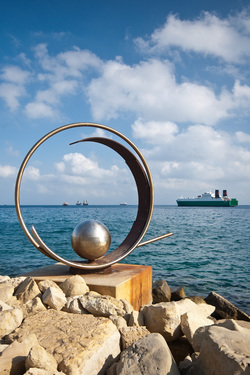
At least, we’re far from that point. For one thing, sequestration is leading us in the right direction.
The larger question is whether what Cyprus decides to do (the subject is scheduled for debate in the Cypriot parliament Tuesday) will have a ripple effect here and, more likely, in Europe.
It would be hard to imagine a worse way to handle an economic crisis than to tax bank accounts. Cyprus got into this problem because its two largest banks made irresponsible loans to the Greek government equal to 160 percent of the GDP in Cyprus.
You shouldn’t even loan Greece a buck for a cup of coffee.
| | As part of an agreement to bail out those banks to the tune of $13 billion, the European Union is requiring Cyprus to raise money from its bank customers. The deal could be framed this way: Either let the government confiscate some of your hard-earned savings or lose your bank and all of your savings and watch your nation fall into a severe recession to boot. Oh, and you’ll likely lose your job in that recession as unemployment skyrockets. You could hardly design a more disastrous bailout. It is a textbook recipe for creating moral hazard. One would think the EU could find an easier way to help its smallest member, an island nation of about 1 million people. It should go without saying that a key to any stable economy is confidence in its banking structure. President Frankly D. Roosevelt spent much of his first two terms trying to urge Americans to pull their money out of their mattresses and stick it back in a bank. People, understandably, had lost faith in banks after so many of them collapsed at the start of the Depression, but that loss of faith was crippling the economy. One of the remedies was to create the Federal Deposit Insurance Corporation, which now guarantees deposits up to $250,000. If Cyprus succeeds in taxing bank deposits (one early proposal was to charge 6.7 percent on accounts worth less than 100,000 euros, and 9.9 percent on those that are larger), other Europeans would be justified in thinking their accounts are not as secure as they once believed, either. Already, ATMs in Cyprus are empty, according to news reports. Banks are on a holiday much of this week to avoid a full-scale run. And because perception can be more powerful than any facts, figures or public assurances, banks in Spain, Italy and perhaps other European countries may be in danger of runs, as well. I doubt U.S. depositors will make a run here. However, Rush Limbaugh has tried to draw connections between Cyprus and the way the Obama administration operates things, insinuating in this transcript that it could happen here. That kind of talk could be a self-fulfilling prophecy. This blog by Scheherazade Rehman of George Washington University, on the other hand, is a good analysis of what’s going on, and the hazards at play. Cyprus has been a haven for Russian depositors, much of it part of an alleged money-laundering scheme. The EU, and particularly Germany, doesn’t like this, which is why it not only wants to tax depositors, it wants to require an international anti-money laundering audit. This also is why Russian President Vladimir Putin is among the most vocal opponents of the plan. But of course, confiscating money from even the smallest bank depositors would likely severely harm Cypriot banks, cause panic in other parts of the EU and shake confidence in other parts of the world, as well. That’s a heck of a price to pay to get at some corruption. |

 RSS Feed
RSS Feed

